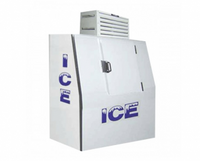
As the backbone of many service industries, there is not a grocery store, restaurant or convenience store that can go about their daily operations without the use of ice. That being said; the real task becomes making sure your ice machine can run for extended periods of time, even while in inclement weather. While it is never the ideal to have commercial ice machines work against extreme temperatures, in some instances it is necessary. Don’t panic just yet! Follow our best practices for operating in hot weather conditions to effectively maintain your ice machine year-round, even when temperatures spike.
Ice Machine Placement
If you own a commercial ice machine or are looking at purchasing one, you may have already asked yourself where the safest place to put it is. Generally speaking, to perform optimally, ice makers should be inside, in a temperature controlled environment. Placing your ice machine outside, or in areas of extreme heat can cause serious productivity issues. The ultimate goal is the longevity of your machine. One way to ensure a full life span of your ice maker is to find a location inside your store or venue that offers a cooler, low-humidity environment.
Air Heat Index
Extreme heat is not always indicative of outside temperatures. Commercial kitchens are another area where placement matters. As the kitchen comes alive with food preparation and workers scattering about trying to fulfill orders, the heat index inside a commercial kitchen will immediately begin to rise. One of the most common problems getting in the way of ice machine efficiency is higher air temperatures, which results in lower ice production. As a general rule of thumb, temperatures approaching 95 degrees will likely put a halt to your machine’s ice production. When deciding where to place your ice machine, factors such as where heat sources are, and access to cool water lines should be taken into consideration.
Increases in Water Temperature
Another problem getting in the way of ice machine efficiency is water temperatures exceeding 80 degrees, making ice production nearly impossible. When higher water temperatures filter into your ice machine, the unit works twice as hard to make up for freezing time needed to produce ice. This can have a negative impact, not only on the ice machine itself, but also for you as a business owner. If you have noticed a decrease in ice production or if your ice machine has completely shut down, there are a few things you will want to check. First things first, check the machine to ensure it is running. When commercial ice machines are affected by extreme temperatures, they often shut down in order to protect themselves. If your ice machine has shut down allow it to remain in this cycle. Next, check the water line to your ice machine and ensure that it is not sharing a hot water line, such as one might find connected to a dishwasher. Improper installation can put your ice machine at risk, especially in commercial kitchens where hot water lines may be more prevalent. When all else fails, contacting a professional may be in order to help you recover the use of your unit. A commercial refrigerator mechanic will likely be able to help pinpoint trouble areas that caused your ice machine to stop working efficiently.
Best Ice Machines for Hot Weather
Hot weather can dictate the type of ice machine that you purchase. Living and working in temperatures that are typically above 90 degrees means searching for a commercial ice machine designed to withstand heat. Water-cooled ice machines perform well in high temperatures because of their unique design; they have two separate water lines, one for ice production, and the other to cool the refrigerant. As these two water lines work together, your ice machine can regulate the temperature more efficiently and continue to produce ice more regularly.
In peak season when the demand for ice is high, it is imperative to check your ice making system thoroughly for proper operation. This means a full inspection of your evaporator, condenser, water filter and air filter. Remember that while the vast majority of ice machine problems happen during the hottest months of the year, following these tips can help you reduce your chances of losing access to ice when the temperatures start to rise.
